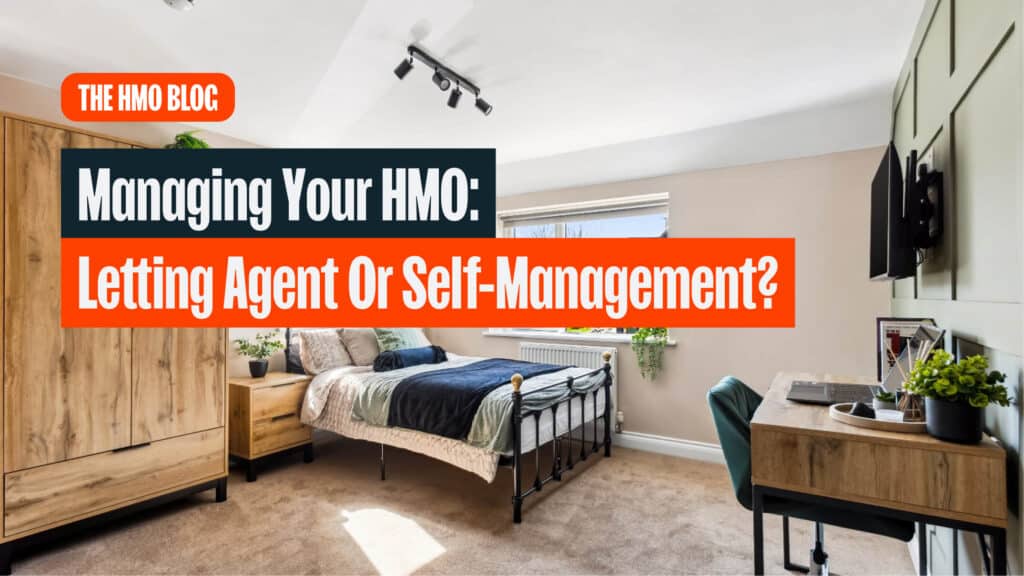
Photo by FM Properties
If you’re running HMOs, sooner or later you’ll face the big question: Do I keep paying a letting agent, or do I take management back in-house?
It’s a decision that shapes not just your bottom line, but also your relationship with your tenants, the level of control you have over your properties, and ultimately the kind of landlord you want to be.
On one hand, letting agents offer convenience, the “promise” of passive income and someone else taking the calls when things go wrong. On the other, self-management puts you firmly in the driving seat, with oversight of every detail and the potential to save thousands each year by cutting agency fees.
But self-management doesn’t have to mean late-night maintenance calls or endless admin for you. With the right systems and the support of a skilled property manager (virtual or otherwise), landlords can step away from the day-to-day grind while still keeping visibility and control.
The real question isn’t just who will manage the property, it’s what kind of landlord do you want to be? Hands-off and dependent on an agent, or an eye on the game with oversight but supported by a property manager who ensures nothing falls through the cracks?
The Case for Letting Agents
Let’s be honest, the appeal is obvious. You hand them the keys, pay the fee, and in theory you could choose to never hear about a leaking tap again.
Why landlords like agents:
- Passive income: the “money-for-nothing” dream.
- Distance: handy if you live miles away (or just don’t want tenants knowing your postcode).
- Responsibility shift: Tenant issues are technically their problem, not yours. The agent is the first point of contact and is responsible for arranging repairs and handling difficult tenants, as well as compliance testing and certification (though when it comes to compliance responsibility as a landlord, you are never really off the hook).
But here’s the catch:
- Cost – 8-15% plus VAT of rent adds up fast. That’s not “one flat white less per week,” that’s holidays, refurb budgets or a new boiler fund gone.
- Visibility – you only know what the agent tells you. One landlord told us he discovered a tenant swap six months after it happened. Surprise!
- Tenant experience – agencies are professional, sure, but agents are often stretched. Tenants can end up feeling like they’re calling a call centre, which can put them off reporting issues. And for landlords it can feel like the honeymoon period has come to an end when they have to chase for information, or rent.
- Not as hands-off as it seems – agents will still ping you for decisions: “Shall we approve this repair?” “How do you want us to proceed?” It’s less set-and-forget and sometimes more pay-for-someone-else-to-chase-you.
For landlords who truly want a hands-off, Netflix-binge-level passive income, agents tick the box. Just don’t expect total silence from your phone or a crystal-clear picture of what’s happening on the ground.
The Case for Self-Management
Self-management doesn’t have to mean you answering the phone while on the beach in Tenerife. With the right property manager in your corner, you can stay in charge without being on call 24/7.
Why landlords increasingly like this route:
- Lower costs – even with a UK-based virtual property manager at your side and some additional expenses for self-managing, it’s usually far cheaper than an agent’s cut.
- Control without chaos – you see what’s going on, your virtual property manager handles the admin and the paper-chasing, escalating to you only when they need to.
- Tenant relationships – tenants often prefer dealing with “a real landlord setup” rather than through an agent. A happy tenant is a sticky tenant, and full rooms make for a happy landlord.
Sticky may be happy, but let’s not sugar-coat it:
- The buck stops with you – your property manager can coordinate all maintenance, but if you won’t approve repairs, they’re stuck. A slow landlord makes for a frustrated PM and tenant.
- Choosing the right property manager is critical – UK-experienced virtual property managers know the legislation and compliance ropes. Overseas VAs are cheaper, but you can’t expect them to have the same depth of experience and familiarity as home-grown UK support – asking them to handle an entire eviction process is like asking your cousin Vinnie to do your tax return. Beyond risky.
- You can’t disappear – if your plan is to hand it all over and vanish, your virtual property manager won’t thank you. We’ve seen great PMs walk when landlords wouldn’t face up to their responsibilities.
Side-by-Side at a Glance
Letting Agent
- 8–15% of rent, plus VAT and often extra charges
- Limited control – you rely on filtered updates
- Professional, but sometimes impersonal tenant experience
- Agent leads day-to-day, landlord still legally liable
- Best for landlords wanting passive income and minimal involvement
Self-Management + Virtual Property Manager
- Lower overall cost – pay by the hour, just the hours you need via a monthly retainer
- High control, low touch – you set the standards, you see everything, but escalate to you only when needed
- More intuitive and responsive tenant relationships
- Landlord leads, supported by a virtual property manager
- Best for landlords wanting oversight without daily admin
Which Landlord Are You?
- If you want income without involvement, keep the agent.
- If you want managerial oversight without the day to day, cost savings, and closer tenant relationships – and you’re prepared to step up as landlord-in-chief: self-management with virtual property manager support is your sweet spot.
Coming Up Next
This month was about deciding. Next month we’ll cover doing: how to actually make the jump from agent to self-management, without the wheels coming off. Think of it as your landlord satnav, guiding you from A (agent) to B (back in control).
Curious to know more about how our team of UK property-savvy virtual assistants at Beam manage the lettings management recovery process for HMO investors? Click here to book a discovery call with us.

About the Author:
Jane Scroggs is the founder of Beam Virtual Property Support, in partnership with The HMO Roadmap. Her team of virtual assistants handles all aspects of lettings, compliance, credit control, and property maintenance, always focused on streamlining your operations. Learn more about Jane here.